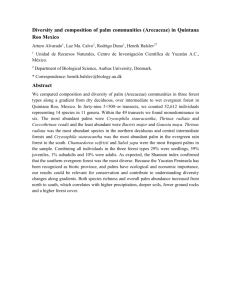Palm Oil Terms, Definitions and Acronyms
advertisement
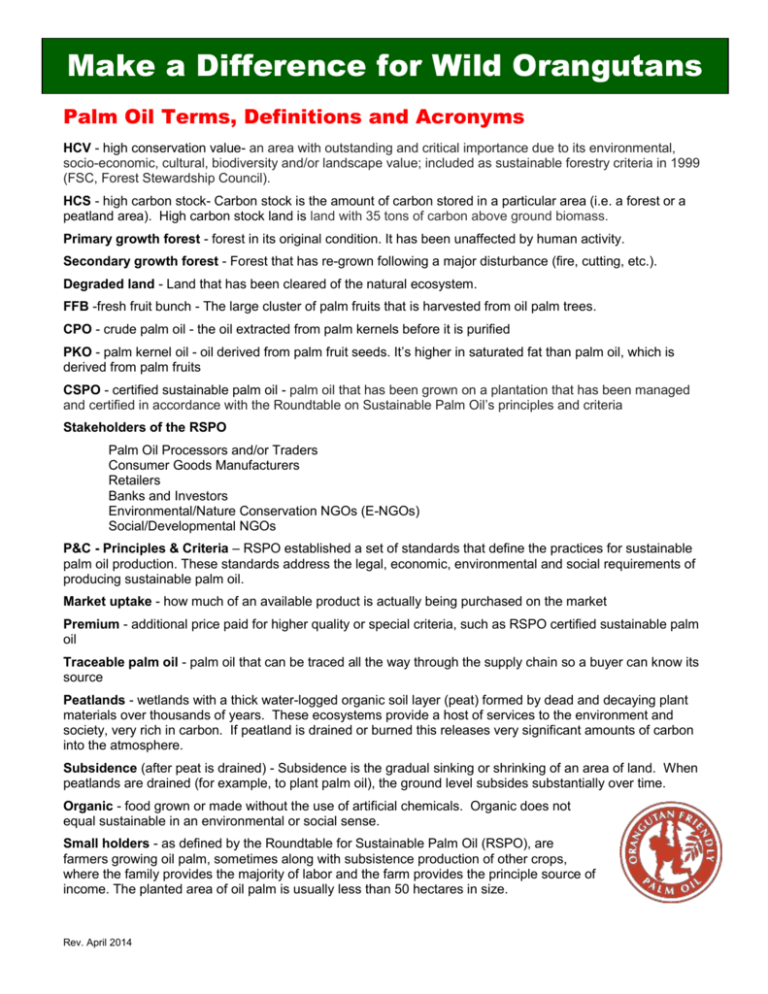
Make a Difference for Wild Orangutans Palm Oil Terms, Definitions and Acronyms HCV - high conservation value- an area with outstanding and critical importance due to its environmental, socio-economic, cultural, biodiversity and/or landscape value; included as sustainable forestry criteria in 1999 (FSC, Forest Stewardship Council). HCS - high carbon stock- Carbon stock is the amount of carbon stored in a particular area (i.e. a forest or a peatland area). High carbon stock land is land with 35 tons of carbon above ground biomass. Primary growth forest - forest in its original condition. It has been unaffected by human activity. Secondary growth forest - Forest that has re-grown following a major disturbance (fire, cutting, etc.). Degraded land - Land that has been cleared of the natural ecosystem. FFB -fresh fruit bunch - The large cluster of palm fruits that is harvested from oil palm trees. CPO - crude palm oil - the oil extracted from palm kernels before it is purified PKO - palm kernel oil - oil derived from palm fruit seeds. It’s higher in saturated fat than palm oil, which is derived from palm fruits CSPO - certified sustainable palm oil - palm oil that has been grown on a plantation that has been managed and certified in accordance with the Roundtable on Sustainable Palm Oil’s principles and criteria Stakeholders of the RSPO Palm Oil Processors and/or Traders Consumer Goods Manufacturers Retailers Banks and Investors Environmental/Nature Conservation NGOs (E-NGOs) Social/Developmental NGOs P&C - Principles & Criteria – RSPO established a set of standards that define the practices for sustainable palm oil production. These standards address the legal, economic, environmental and social requirements of producing sustainable palm oil. Market uptake - how much of an available product is actually being purchased on the market Premium - additional price paid for higher quality or special criteria, such as RSPO certified sustainable palm oil Traceable palm oil - palm oil that can be traced all the way through the supply chain so a buyer can know its source Peatlands - wetlands with a thick water-logged organic soil layer (peat) formed by dead and decaying plant materials over thousands of years. These ecosystems provide a host of services to the environment and society, very rich in carbon. If peatland is drained or burned this releases very significant amounts of carbon into the atmosphere. Subsidence (after peat is drained) - Subsidence is the gradual sinking or shrinking of an area of land. When peatlands are drained (for example, to plant palm oil), the ground level subsides substantially over time. Organic - food grown or made without the use of artificial chemicals. Organic does not equal sustainable in an environmental or social sense. Small holders - as defined by the Roundtable for Sustainable Palm Oil (RSPO), are farmers growing oil palm, sometimes along with subsistence production of other crops, where the family provides the majority of labor and the farm provides the principle source of income. The planted area of oil palm is usually less than 50 hectares in size. Rev. April 2014 Transparency - operating in such a way that it is easy for others to see what actions are performed; open and honest Certification Mechanisms of the RSPO: Book and Claim (B&C) - provides tradable certificates for RSPO certified palm oil to the palm oil supply base. The supply base may then offer these certificates on a web based transaction system to end users who choose to support specific volumes of RSPO certified palm oil and or their derivatives. It is the least rigorous mechanism, but is able to be initiated easily via web transaction within a day. Mass balance (MB) – physical supply chain. Administratively monitors trade in RSPO-certified sustainable palm oil and its derivatives throughout the supply chain, and is an interim solution until the trade in sustainable palm oil becomes mainstream. The Mass Balance system allows RSPO-certified sustainable palm oil to be mixed with conventional palm oil at any stage of the supply chain process provided that overall company quantities are controlled. Segregated (SG) – physical suuply chain. Assures that RSPO certified sustainable palm oil and its derivatives delivered to the end user come only from RSPO certified sources, 100%. However, it allows mixing RSPO-certified sustainable palm oil coming from different certified plantations so the identification of a single original source is not possible. Identity preserved (IP) – physical supply chain. This system assures that the RSPO-certified sustainable palm oil and its derivatives delivered to the end user are uniquely identifiable to a specific mill and its supply base and are kept physically separated from all other oil palm sources throughout the supply chain. This is the most rigorous mechanism. Green Palm certificate - GreenPalm is a certificate trading program which is designed to tackle the environmental and social problems created by the production of palm oil. By selling certificates through the GreenPalm program palm oil producers can earn more for their crop through sustainable farming. GreenPalm is a Book and Claim system of sustainable palm oil certification. When CSPO was not physically available GreenPalm was a good option to get the system started. NGO – Non-governmental organization E-NGO – Environmental or conservation organization EB - Executive Board (RSPO) GA - General Assembly (includes voting, RSPO); one person from each RSPO member company or organization may participate in the GA. RSPO Quorum – as stated in the original statutes, the required quorum was 50% of the ordinary members either present or represented (via proxy) – this was necessary in order to consider voting results valid. In March 2012, the quorum was amended – the General Assembly shall be ‘validly constituted if a minimum of 80 of the Ordinary Members are present or represented’. ACOP - annual communication of progress (RSPO) GHG - green house gas POME - Palm oil mill effluent (waste) – the single largest source of Greenhouse Gas (GHG) in the operation of a palm oil mill. During the anaerobic digestion of POME in open ponds, methane gas is emitted to the atmosphere. Methane capture - Reduction GHG emissions by capture of methane. Methods can include POME closed tanks anaerobic digestion systems or covered lagoon systems. The captured methane can be utilized in a boiler for steam generation or biogas generator for power generation. ha = hectare; 1 hectare = 2.471 acres or 10,000 square meters Supply chain (palm oil) – plantation, mill, storage, transport/shipping, refiners & blenders, ingredient manufacturers, product manufacturers, retailers HGU – This stands for Hak Guna Usaha, land cultivation rights title. HGU may be owned by Indonesian citizens or by corporations established under Indonesian law and domiciled in Indonesia. HGU gives the right Rev. April 2014 to use state-owned land for the purpose of agriculture. Foreigners and foreign legan entities, in principle, cannot be granted an HGU. However, Foreign Capital Investment Companies engaging in agriculture are permitted to obtain an HGU, even if they are 100% foreign-owned. FPIC – Free, Prior and Informed Consent – this has emerged as a key principle in int4ernational law related to indigenous peoples and has been widely accepted in private sector policies of corporate social responsibility. It has also been endorsed by the RSPO as a key principle in its Principles and Criteria. HCV compensation mechanism - In 2011, the RSPO Executive Board has decided that there will be a facilitated process within the RSPO to develop a framework document to guide members through the process of compensating for land cleared without prior High Conservation Value assessment between November 2005 and November 2007. REDD - Reducing Emissions from Deforestation and (Forest) Degradation is a mechanism that has been under negotiation by the United Nations Framework Convention on Climate Change (UNFCCC) since 2005, with the twin objectives of mitigating climate change through reducing emissions of greenhouse gases and removing greenhouse gases through enhanced forest management in developing countries. RED - Renewable Energy Directive, of the European Union; selected info: promotion of the use of energy from renewable sources, minimum 10% in every Member State in 2020. Regarding the expansion of biofuels use in the EU, the Directive aims to ensure the use of sustainable biofuels only, which generate a clear and net GHG saving without negative impact on biodiversity and land use. ISPO – Indonesian Sustainable Palm Oil; – A non-profit organization established in 2009. Generally viewed as less rigorous than RSPO certification. While RSPO membership is voluntary, ISPO criteria are mandatory for Indonesian oil palm growers. YASBI - Yayasan Kelapa Sawit Berkelan Jutan Indonesia – translated name of ISPO. MPOB - Malaysian Palm Oil Board - is a government agency responsible for the promotion and development of the palm oil industry in Malaysia. The MPOB is one of agencies under Malaysia's Ministry of Plantation Industries and Commodities MSPO - Malaysia Sustainable Palm Oil - In 2011 Malaysia began developing a national certification to improve involvement in sustainable palm oil production nationwide. The certification program, aimed at small and medium sized producers, is expected to be launched in 2014. National Interpretation - The RSPO developed national interpretations of the generic criteria in 2007 to allow for differences in national legislation in producing countries. Organizational Acronyms: AZA – Association of Zoos and Aquariums – accredits facilities in North America WAZA – World Association of Zoos and Aquariums OLT – Orangutan Land Trust CI – Conservation International TFT – The Forest Trust UCS – Union of Concerned Scientists SOCP – Sumatran Orangutan Conservation Programme, funded by PanEco SOS – Sumatran Orangutan Society FFI – Flora and Fauna International BORA – Borneo Rhino Alliance OIC – Orangutan Information Centre Hutan – funds KOCP – Kinabatangan Orangutan Conservation Programme WRI – World Resources Institute, has developed mapping abilities for palm oil and forest monitoring BOS – Bornean Orangutan Survival These are just a few, there are many more. Rev. April 2014

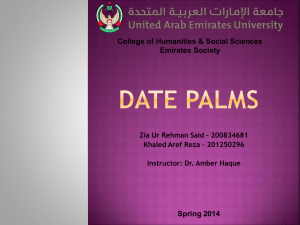
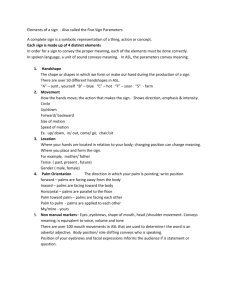
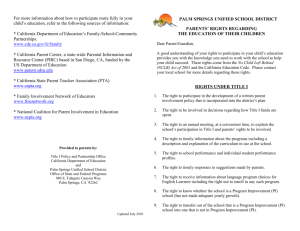
![Senior Supplier: [S Murphy]](http://s2.studylib.net/store/data/005470081_1-e104ea2fd5e2b6661eb586c19f7a89ca-300x300.png)
